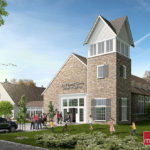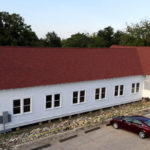A gap exists between generations in the church, experts seem to agree—and building strong relationships may be the way to bridge it.
|
Irene Hale, a resident at the Arcadia Valley campus of The Baptist Home in Missouri, visits with Michelle Price from the Baptist Student Union at Missouri University of Science and Technology at Rolla, Mo.
|
“There is difficulty in reaching across generations,” said Chris Gambill, congregational health service manager for the Center for Congregational Health. “More generations are present than ever before.”
That’s true even in his home—with a 13-year-old and a 17-year-old and his 88-year-old mother. “She can’t understand their world, and they can’t understand hers in some ways. It’s very difficult to overcome,” he said.
And that disconnect hurts the church’s ministry. “At the simple level, we do the larger world and the kingdom harm because we are not helping people learn to cross barriers. It runs counter to missions … and accidentally sends a mixed message.
“We’re also hurting ourselves. … We face a high level of conflict between generations, (and failure to cross generational barriers) will feed it because we don’t learn to deal with conflict.”
Causes
Experts cite several reasons the gap exists between older and younger members in a congregation and between churches and the young adults they hope to reach.

Olivia Dunham, a sixth grader at Moody Middle School in Richmond, Va., reads the New Testament lesson during a Sunday morning worship service at First Baptist Church in Richmond. (PHOTO/Courtesy First Baptist Church in Richmond, Va.)
|
Edward Hammett contends in his book, Reaching People Under 40 while Keeping People over 60, the tension between modern and postmodern culture is the primary issue. He describes the differences between generations—worldview, spiritual understanding and leadership styles.
Sign up for our weekly edition and get all our headlines in your inbox on Thursdays
Gil Rendle, a senior consultant with the Texas Methodist Foundation’s Institute for Clergy and Congregational Excellence, agrees that differences create barriers. Each generation shares lessons learned, a value system and “a way of seeing” that act as lens or filters through which the church and spirituality are viewed. Each generation—older and younger—sees its way as “the right way,” he said.
“Emerging Christian leaders have created their own trendy culture, complete with buzzwords, technological savvy and rock star pastors. And some older leaders are stuck in boring ruts of tradition,” claimed J. Lee Grady in a Jan. 12, 2010, blog entry on charismamag.com. “Ageism is a reality, and it works both ways.”
Gambill and Rendle agree that a “me-first” mentality often emphasizes differences. Rendle argues that the focus on niches in today’s advertising and marketing industries has given people—even at church—“an increasing sense of entitlement when it comes to having things (including worship) ‘their way.’ For most congregations such fine-tuning may not serve the sense of ‘community’ very well.”
Some leaders also point to a watering down of social connections and a bent to consumerism. “Across the board (of generations), there is a lack of social capital. People are lonelier,” Gambill believes. That disconnect between individuals and between generations leads to a breakdown in community.
Earlier generations “had more time and were more adept at building social capital,” he added. The mobility of today’s society and economic pressures on families tend to isolate individuals from one another.
Facilitating change
Communication and willingness to listen are keys to change, some leaders believe. The church needs to nurture those young adults who do attend church, and include them in leadership and decision-making, Hammett believes. The church must give them the tools for reaching their peers.
“Church leaders need to listen to this generation,” he said. Young adults who challenge older methods do so because they care, and “often their criticism has an element of truth.”

High school girls take a break during a ministry project working in Maxine Lee’s yard on a Saturday afternoon as part of a DiscipleNow youth retreat at First Baptist Church in Duncanville. (PHOTO/Courtesy Greg Bowman)
|
Their thinking “should be taken seriously if the church is to reach and keep this generation. And when older adults listen to them, chances are the younger adults will in turn listen to the older adults,” Hammett wrote.
Gambill stressed building in time to connect. “Build community into the ways you do church,” he said. Build time even into committee meetings to get to know one another. Change seating at all-church meals, or adjust the time between Sunday morning Bible study and worship for fellowship time, he suggested.
“There are a number of pretty simple things churches can do. We must be intentional,” he said. “We tend to cocoon ourselves with only the people we know. Newcomers find it difficult to get connected. People are most hungry for community and relationship.”
Greater connectedness and emphasis on building relationships brings generations back together. Susan McBride with the Virginia Baptist Mission Board’s Emerging Leaders team sees targeting young adults as a return to the neighborhood church concept in some respects. She recalled growing up as a Baby Boomer in a neighborhood of young, middle-class families with children.
“I believe it’s the same tension as when we grew up. When we were young, we didn’t want to do church the same way our parents did. We wanted our music and our language,” she said. “Now our children as young adults want to practice faith their way. They want to focus on doing ministry instead of doing church.
“It’s like we’re getting back to the neighborhood church, but not in the survival mode” of those still stuck in the traditions of the 1950s and ’60s, she said.
And, she added, because the new starts often target the age demographic in a specific area, the neighborhood becomes a point of commonality. Then as those young adults marry, have children and deal with their own aging parents, the demographic changes.
“I think these (new) communities will grow old together,” McBride said.














We seek to connect God’s story and God’s people around the world. To learn more about God’s story, click here.
Send comments and feedback to Eric Black, our editor. For comments to be published, please specify “letter to the editor.” Maximum length for publication is 300 words.